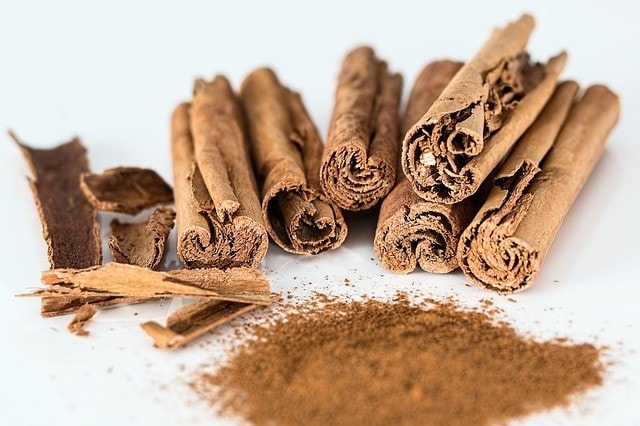Cinnamon bark has been used for thousands of years and has long been hailed as a valuable spice both for its aromatics and flavor. Today it is easily found on grocery store shelves and is used to add rich, spicy flavorings to both sweet and savory dishes and drinks, and is popularly used in air freshening techniques. Cinnamon is much more than just a great smell and spice to add to dishes- it also has a wide range of variable benefits you can take advantage of.
Cinnamon oil is a great way to get all the benefits of this spice in a concentrated form. It is easily acquired, easy to make yourself, and is easy to use in any manner you choose. This article provides all you need to know about this valuable oil, and why it is worth having around.
Origin of Cinnamon

Native to Asia, Sri Lanka specifically, some of the first written mention of cinnamon use dates back close to 5000 years. A valuable spice, it has been found as part of Egyptians embalming process, was traded as currency, was an early medicinal treatment, and even had wars waged over it. Despite being considered somewhat rare early in its history, it is easily grown throughout most tropical climates- now making it much easier to acquire than hoping it may be a spoil of war.
As mentioned, cinnamon is actually found under the bark of a wide variety of evergreen trees. This secondary layer of bark is accessed by first peeling away the bark and harvesting what is found underneath. When dried it curls up on itself, making the ‘quills’ of cinnamon you can find in the stores for variable uses.
Active Ingredients
Cinnamon oil is extracted directly from these quills, the outer bark of the tree, the leaves of the tree, or the root- and provides a concentrated form of both the scent and flavoring. The effectiveness of this oil is due to the various ingredients found in the plant, found in various concentrations based upon what part of the plant the oil is derived from.
Cinnamaldehyde (Cinnamic aldehyde)
Found in the highest concentrate from the bark, this is what provides the characteristic smell and taste to cinnamon. It is also highly prized for its ability to work as an insecticide and fungicide.
Camphor

Root extractions yield high amounts of camphor, an anti inflammatory, digestive aide, joint pain reliever, and congestion reliever.
Coumarin
Coumatin is an anti inflammatory, helps with blood flow, and also supports the body’s ability to form blood clots.
Eugenol
Leaf oils provide higher percentages of eugenol, which is also found in cloves in high concentrates. This is an antiseptic, anti-inflammatory, and works as a gentle numbing agent for pain relief.
Linalool
A type of terpene, linalool provides some of the aromatice cinnamon is so popular for, and also is widely believed to help reduce stress and pain as an anti inflammatory and gentle sedative.
Cinnamon Oil Uses

Cinnamon, despite being a strong oil, has a wide variety of uses. It can be inhaled, applied topically, and ingested to take advantage of its many benefits. Although use of oil concentrate should always be approached with caution due to its strength (see warnings below), it is considered a fairly safe oil when used properly.
Diffusion
Put a few drops of oil in your diffuser or water spray bottle to take advantage of its spicy, sweet smell. Diffuse up to 30 minutes 3 times a day, or spray on your carpets or curtains to help spread the warmth throughout the room.
Topical
Mix with other favorite oils, or use as is, in a carrier and spread over your skin. Always use in a diluted manner to avoid a stinging sensation. It can also be added to facial masks, moisturizers, shampoos, etc as well.
Ingestible
Put a few drops in hot tea, add to foods for flavoring, or drop into a capsule to swallow.
Cinnamon Oil Warnings

The warnings surrounding the oil are mostly based on over usage rather than safe doses. High amounts of coumarin can cause liver damage, so avoid taking too much on a regular basis to avoid this. Also- longer exposures to the inside of the mouth or skin can cause irritation, resulting in mouth sores or skin irritation. A tingling or burning sensation often accompanies this.
It also can help lower blood sugar, meaning if you already have low blood sugar you could trigger a hypoglycemic reaction. This is marked by increased fatigue, dizziness, and even fainting spells.
Be sure to check with interactions with any drugs you may be taking. If you are on a regular prescription always check with your healthcare provider before adding anything new to your diet.
Benefits of Cinnamon Oil Use
There are many benefits to adding this oil into your regular routine. Whether you simply enjoy the scent or love the flavor you will be a healthier version of yourself when you begin to use it regularly.
Heart Health

Use of the oil can help lower bad cholesterol while raising good cholesterols. The anti-inflammatory and anti-platelet compounds benefit arterial heart health especially in those who have suffered from a heart attack.
Aphrodisiac
Cinnamon has long been used to ‘set the mood’ and also aid in erectile dysfunction, mainly due to its ability to improve blood circulation.
Lowers Blood Sugar Levels
It also supports insulin release to help keep blood sugars at normal levels. It also can help regulate and lower levels in those who suffer from high blood sugar.
Boost Hair Growth

Use as a scalp treatment or add a few drops to shampoo to stimulate the scalp. This creates a healthier environment and supports healthy hair growth.
Combate Acne
Antimicrobial compounds are effective against acne, plus it helps reduce inflammation (always mix with a carrier oil however to avoid skin sensitivity). It also can help soothe inflamed rashes.
Support Weight Loss
The ability to balance blood sugar, and the slightly sweet taste, allows this oil to support weight loss. Studies are also favorable to support thermogenic and metabolic responses in fat cells.
Help Heal Ulcers

Cinnamon combats the bacteria known to cause ulcers and also allows for an anti-inflammatory effect for continual healing.
Combate Internal Parasites
In the unfortunate event you are plagued by an internal parasite (most cause stomach discomforts), you can support the removal of and continued healing with cinnamon.
Combate Skin Fungus
Combate athletes foot, toenail fungus, or any other funguses you may have a worry about with cinnamon. Dilute with coconut oil (another antibacterial and antifungal agent) and work into afflicted areas.
Soothe Sore Throats

All of the benefits cinnamon provides supports the soothing of, and healing of, sore throats. Drink in hot tea to help fight infection, reduce pain and swelling, and help heal damage.
Deodorize Your Home
What more is there to say? Diffusion and spraying helps deodorize your home, kill off microbes, and detoxifies the environment. Plus it smells great!
Help Focus and Calm Your Mind
The ingredients in the oil also help stimulate memory, calming, and creates focus. Diffusing or taking a sniff from an oil bottle allows for oil particles to enter into the bloodstream to reap these benefits
Reduce Allergy Symptoms

Diffusing the oil can help with congestion and other allergy related symptoms. It also works to heal any irritation that may have occurred, such as a raw throat from post nasal drip.
Help Heal Mouth Sores
Add a few drops to you mouthwash or a little water and swish to help kill mouth bacteria and heal mouth sores.
Deter Insects and Rodents
Insects and rodents seem to steer clear from this oil. Mix with other insect repelling oils, such as peppermint and lemon, and spray in door frames, windows, and other areas of home entry. You can also diffuse it outdoors to help deter biting insects.
Make Your Own Cinnamon Oil

The oil is usually abstracted through a stream distillation process to provide you a pure concentrate. But it is also incredibly easy to make you own, albeit not as strong, version at home. All you need is a carrier oil of some sort, such as fractionated coconut oil, flax seed oil, olive oil, etc… and some cinnamon- either ground or in sticks.
Sterilize a few glass jars and pack them with the sticks and cover with the oil of your choice, or stir together the ground cinnamon with oil over the stove until well blended (about 10 minutes) and pour into jars, and then seal to allow the oils to steep for about 3 to 4 weeks.
Strain the oil through cheesecloth into a new jar when ready- you can leave the oils to steep longer if you want a stronger flavor. Store in a cool dry place or in the refrigerator. Most oils can last a few years on the shelf, but be sure to check with the type of oil you use for best usage.
Conclusion
In conclusion, if you love the smell of cinnamon and enjoy it in some of your favorite dishes, then keep on using it! Using an oil version also provides an easy to store alternative to sticks and ground powders, and allows you to use it in other ways – such as topically and in a spray or diffuser.
Your heart, digestive system, body and mind will thank you for adding it to your life. Do you have any favorite ways to use cinnamon? We’d love to hear below! And, as Always, please share.
The post Benefits of Cinnamon Oil: More than Just a Popular Spice appeared first on Better Mind Body Soul.
No comments:
Post a Comment